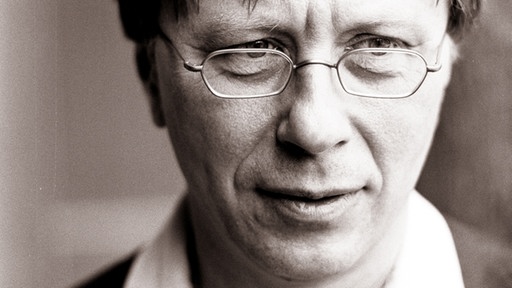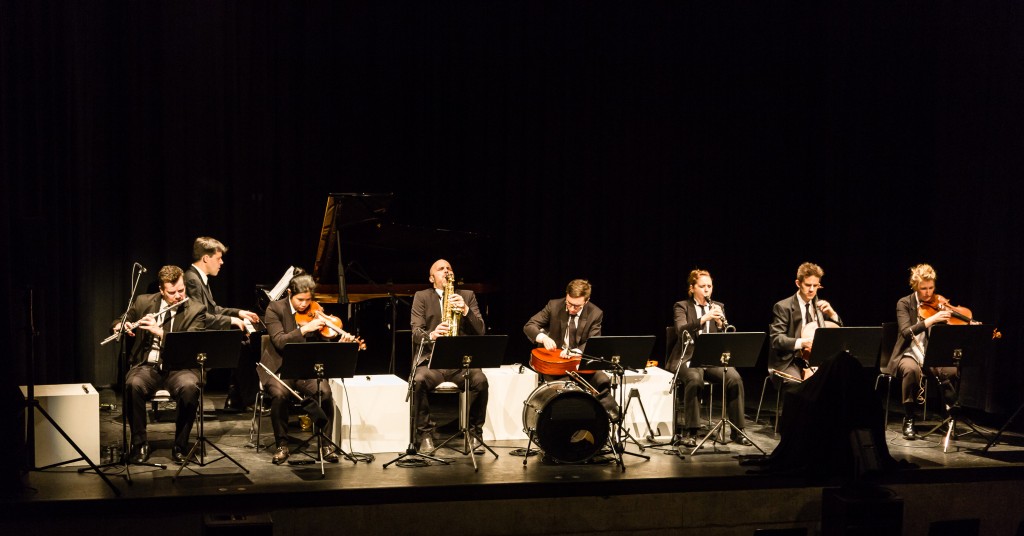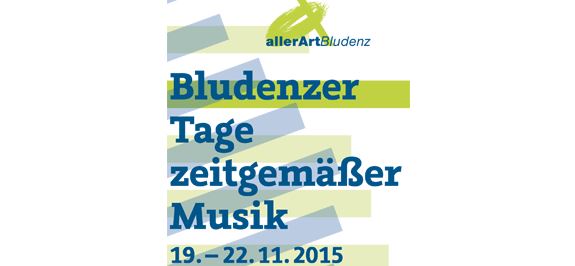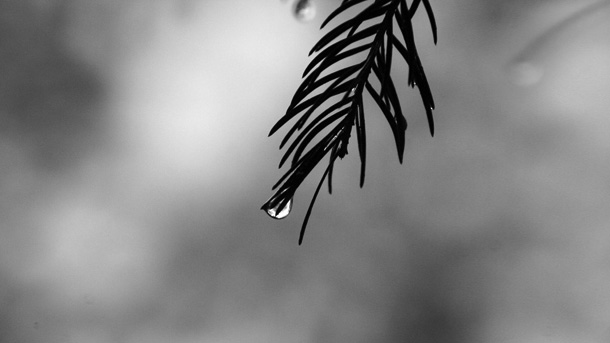Early Career Commissioning Program 2024
Talea Early Career Commissioning Program 2024/25 Season
The Talea Ensemble is pleased to announce our Early Career Commissioning Program for the 2024/25 season. Talea will commission the selected composer to create a 10-15 minute work of 5+ players for the ensemble, to be premiered in March 2025 in New York City. Priority will be given to a composer who has not had significant experience working with a professional music ensemble.
Composers/creators of written music of all ages (18+) may apply, and there are no geographical restrictions. We welcome participants of all musical styles, genres, and educational backgrounds. This program is recommended for composers who identify as in their early stages of their career who have not had extensive experience working with professional ensembles. Composers who have not had their work premiered by a professional ensemble are especially encouraged to apply.
Talea staff will review the applications in the preliminary round. We are pleased to announce that composers Wang Lu and Czaya Czernowin will join us as panelists for the final adjudication round.
The selected composer will receive:
– A commissioning fee of $2,000 for a new chamber ensemble work of 10-15 minutes
– Up to $800 travel reimbursement to work with Talea in New York City and attend the piece’s premiere
– Audio documentation of the premiere performance
– Promotional support
We recognize the time and effort it takes to submit your materials for consideration; though we are only able to select one composer this year, our team is always seeking out new voices in our repertoire and eager to get to know your work!
Dates & Deadlines
July 9, 2024: Application due
August 2024: Notification of selected composer
March 2025: Premiere in New York City on our Written for Talea program in Cary Hall at the DiMenna Center for Classical Music
Feel free to reach out to stephanie@taleaensemble.org with any questions.
Apply at
Talea Recording Workshop @ Queens College, January 2024
Talea Recording Workshop @ Queens College, January 15-20, 2024
Applications Due November 5, 2023 at 11:59 PM EST (extended!)
LAUNCH APPLICATION
Announcing the Talea Ensemble’s 2024 Recording Workshop! From January 15-20, 2024 at Queens College, Talea will work with a group of early-career composers to workshop recently written pieces and produce a high-quality professional recording for the composer’s future use. New this year: the week will also culminate in a public performance of the workshopped pieces. Free of cost to participants, this program seeks to support early-career composers by addressing the barriers they face in reaching professional milestones.
Instrumentation: Talea will workshop and record works of up to 15 minutes for 3-8 players. The following instrumentation is available for this year’s workshop (one of each instrument): Flute, Bassoon, Trumpet, Trombone, Piano, Violin, Cello, Conductor. We are unable to accommodate electronics for the 2024 workshop.
Composers/creators of written music of all ages (18+) based in the U.S. may apply. We welcome participants of all musical styles, genres, and educational backgrounds. This program is recommended for composers who identify as in their early stages of their career who have not had extensive experience working with professional ensembles. Composers who have not had their work recorded by professional chamber ensembles are especially encouraged to apply.
Each participant will be offered a stipend towards transportation to New York and accommodation, to ensure that travel expenses do not pose a barrier to participation. Feel free to reach out to stephanie@taleaensemble.org with any questions.
DATES & DEADLINES
Application Deadline: Sunday, November 5, 2023 at 11:59 PM EST (extended)
Notification of Applicants: November 20, 2023
Workshop: January 15-20, 2024
APPLICATION INSTRUCTIONS
Through the application, we want to get to know you, your work, and how you feel the workshop will help further your artistic and professional pursuits. It’s free to apply, and applications are due Sunday, November 5, 2023 at 11:59 EST. Here is an overview of the application:
Work Samples:
We’ll ask you to share a score to the ensemble work for 3-8 musicians that you would like Talea to record, as well as the score to another recent original work of any instrumentation. In addition to the scores, you have the option to submit recordings (non-professional or midi are fine) in the form of audio/video links. Recordings are not required to apply.
Project Statement:
In under 250 words, tell us how participating in this workshop will help you to achieve your artistic and professional goals.
Background:
Have you had any of your work recorded by a professional chamber music ensemble? (Yes/No) If yes, please tell us when, and which ensemble.
Upload a CV, resume, or bio – it’s up to you.
Professional Development:
What topics would you be interested in learning about in the panel discussions and artist talks as a part of the workshop?
Availability:
Will you be available to join Talea in-person for the entirety of the workshop from January 15-20, 2024 in New York City?
FREQUENTLY ASKED QUESTIONS:
How do you define early-career?
This program is recommended for composers of any age who have not had extensive experience working with professional ensembles. Composers who have not had their work recorded by professional chamber ensembles are especially encouraged to apply.
Am I eligible if I’m a student?
Yes, as long as you are over 18.
Will you consider workshop and recording works with electronics or multimedia components?
Normally we love working with electronics, but unfortunately we aren’t able to accommodate works with electronics for the 2024 workshop.
What instrumentation is available for the recording?
Talea will workshop and record works of up to 15 minutes for 3-8 players. The following instrumentation is available for the 2024 workshop (one of each player): Flute, Bassoon, Trumpet, Trombone, Piano, Violin, Cello, Conductor
Talea Recording Workshop @ Queens College, January 2023
Talea Recording Workshop @ Queens College, January 9-14, 2023
Applications Due November 20, 2022 (extended)
From January 9-14, 2023 at Queens College, Talea will work with a group of early-career composers to workshop recently written pieces and produce a high-quality professional recording for the composer’s future use. Free of cost to participants, this program seeks to support early-career composers by offering them practical career building resources.
Composers and creators of written music of all ages (18+) based in the U.S. may apply. We welcome participants of all musical styles, genres, and educational backgrounds. This program is recommended for composers who identify as in their early stages of their career who have not had extensive experience working with professional ensembles. Composers who have not had their work recorded by professional chamber ensembles are especially encouraged to apply.
Each participant will be offered a stipend towards transportation and accommodations, to ensure that travel expenses do not pose a barrier to participation. Homestay options in NYC may be available.
Feel free to reach out to stephanie@taleaensemble.org with any questions.
DATES & DEADLINES
Application Deadline (extended): November 20, 2022 at 11:59 PM
Notification of Applicants: early December 2022
Workshop: January 9-14, 2023
APPLICATION INSTRUCTIONS
Through the application, we want to get to know you, your work, and how you feel the workshop will help further your artistic and professional pursuits. It’s free to apply, and applications are due November 20, 2022.
Here are the main application components:
Work Samples:
We’ll ask you to share a score to the ensemble work for 3-8 musicians that you would like Talea to record, as well as the score to another recent original work of any instrumentation. In addition to the scores, are welcome to submit recordings (non-professional or midi are fine) in the form of audio/video links.
Project Statement:
In under 250 words, tell us how participating in this workshop will help you to achieve your artistic and professional goals.
Professional Development:
What topics would you be interested in learning about in the panel discussions and artist talks as a part of the workshop?
Background:
CV, resume, or bio – it’s up to you.
FREQUENTLY ASKED QUESTIONS:
How do you define early-career?
This program is recommended for composers of any age who have not had extensive experience working with professional ensembles. Composers who have not had their work recorded by professional chamber ensembles are especially encouraged to apply.
Am I eligible if I’m a student?
Yes, as long as you are over 18.
Will you consider workshop and recording works with electronics or multimedia components?
Normally we love working with electronics, but unfortunately we aren’t able to accommodate works with electronics for the 2023 workshop.
What instrumentation is available for the recording?
Talea will workshop and record works of up to 15 minutes for 3-8 players. The following instrumentation is available for the 2023 workshop (one of each player): Violin, Viola, Cello, Flute, Clarinet, Bassoon, Piano, Percussion
Will you consider additional instrumentation requests?
In extraordinary circumstances we may consider additional requests outside of the listed instrumentation on a case by case basis. The application allows you to indicate if you have additional requests.
Open Forms Podcast
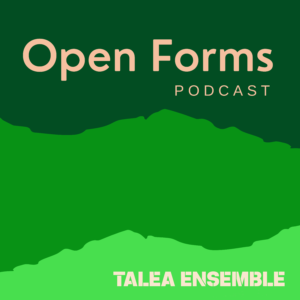
Coming soon! The Talea Ensemble’s Open Forms podcast series looks at the role of contemporary music in our daily lives and how music can offer points of connection to the world around us. Through conversations with guests and artistic collaborators, we explore ways in which music is evolving to fit our world today.
Listen to Open Forms at https://anchor.fm/taleaensemble. Other listening platforms to be announced! Our first episode premieres on Wednesday, March 10th, 2021 and will feature a conversation with composer Alican Çamcı.
Emerging Composer Commissioning Program
Applications Due: September 1, 2020
The Talea Ensemble is pleased to announce our inaugural commissioning program for an early-career composer in the 2020-21 season. Talea will commission the selected composer to create a work for the ensemble, to be premiered in March 2021 in New York City. We would like to work with a composer in the early stages of their career for whom this commission represents a significant professional opportunity.
We welcome composers of all musical styles and genres, ages (18+), and educational backgrounds. Composers who identify as Black, Indigenous, and/or People of Color, as well as women and and gender non-binary composers, are strongly encouraged to apply.
The selected composer will receive:
A commissioning fee of $1,500 for a new chamber ensemble work of 10-15 minutes, a $500 travel stipend to work with Talea in New York City and attend the piece’s premiere, audio documentation of the premiere performance, and promotional support.
We recognize the time and effort it takes to submit your materials for consideration; though we are only able to select one composer in the first year of this program, our team is always seeking out new voices in our repertoire and eager to get to know your work!
Feel free to reach out to alex@taleaensemble.org with any questions.
ELIGIBILITY:
Composers of all nationalities and ages (18+) are welcome to apply.
DATES & DEADLINES:
September 1, 2020: Application due
Late September 2020: Notification of selected composer
March 20, 2021: Premiere in New York City
APPLICATION INSTRUCTIONS:
Through the application, we want to get to know you, your previous work, and your ideas for a collaboration with Talea. It’s free to apply, and applications are due September 1, 2020.
Here are the main application components:
2 Work Samples: We’ll ask you to share audio/video links and a score to an ensemble work (for 3-15 musicians) and any original work of your choice. We’re looking to get to know your creative voice and the kinds of ideas you might bring to an ensemble piece for Talea.
Project Statement: In under 300 words, tell us about your ideas for a new work for Talea!
Background: CV, resume, or bio – it’s up to you.
FREQUENTLY ASKED QUESTIONS:
How do you define emerging?
We are looking to work with a composer of any age in the early stages of their career for whom this commission represents a significant professional opportunity.
If chosen, would I have to travel to New York for the premiere?
It’s not required, but we’re encouraging the selected composer to join us in New York City leading up to the premiere. At this time, we’re able to offer a $500 stipend towards the costs of travel and accommodation in New York.
Am I eligible if I’m a student?
Yes, as long as you are over 18.
Will you consider ideas for works with non-traditional notation and/or electronics?
Yes!
What if I don’t have a live recording my work samples?
We understand that it’s not always possible to submit recordings of your previous work. While we prefer live performances, we’ll consider MIDI renditions if a recording is not available.
Do you expect the COVID-19 pandemic to affect plans for the live performance of this piece?
As of now, we’re planning to premiere the piece in March 2021, but we recognize that circumstances may change. If we’re unable to perform the piece in March, we’ll find another performance date in the 2021-22 season.
American Immersion: Georg Friedrich Haas
In February 2016, the Talea Ensemble collaborates for the fourth time with the Austrian Cultural Forum New York to present “American Immersion“, its annual series offering in-depth portraits of important voices in contemporary composition to American Audiences. This year, Austrian-born and New York-based Georg Friedrich Haas is featured, one of Europe’s major composers today.
This year’s portrait features again chamber and large ensemble programs: the JACK Quartet will perform the 50 minutes long In iij. Noct. (2001) in complete darkness at the ACFNY, while the Talea Ensemble will play a program of Haas’ pieces for larger ensembles at the Bohemian National Hall, featuring the US premiere of his 2009 work for chamber orchestra and soprano …wie stille brannte das Licht.
The introduction to this work states:
The defining feature of Georg Friedrich Haas’ creative work is his work with the minutiae of sound creation. “The love of sound, the love of the sounds that unfold like living beings in time and space“, he wrote in his Notes on Composition, “is for me one of the founding principles of my work“. Like, for example, Giacinto Scelsi – but with the key difference that he created his tonal effects with precisely noted scores – Haas focuses his attention on the possibilities of microtonality and the complex internal life of sound (for example the combined effects of different overtones or partial tones), creating sound worlds and harmonic colours that go beyond the possibilities of the traditional eleven-note tempered half-tone scale.
ABOUT THE COMPOSER:
Georg Friedrich Haas has emerged as one of the major European composers of his generation. His music synthesizes in a highly original way the Austrian tradition of grand orchestral statement with forward-looking interests in harmonic color and microtonal tuning that stem from both French spectralism and a strand of American experimentalism. The result is an exploratory, uncompromising music that is also sensuously attractive. His music appeals to unusually diverse constituencies, from avant-garde composers for its microtonal investigations to casual listeners for its spacious forms and euphonious harmony.
Haas has composed several operas and concertos and a variety of chamber works, including seven string quartets. His hour-long in vain, for 24 musicians, is widely regarded as one of the most original and path-breaking new compositions in the past quarter century. Another important work is limited approximations, for orchestra and 6 microtuned pianos. He has received numerous national and international prizes, including the Kompositionspreis of the SWR Symphony Orchestra (2010) for limited approximations and the Grand Austrian State Prize for Music (2007), the country’s highest artistic honor.
Since 2013, Haas holds a full-time tenured professorship in composition at Columbia University. Before that he has held dual professorships at the Hochschle für Musik in Basel, Switzerland, and the Kunstuniversität in Graz, Austria.
PROGRAM:
February 24, 2016 at 7:30 PM – JACK Quartet
In iij. Noct (2001)
JACK Quartet
Venue:
Austrian Cultural Forum
11 East 52nd Street
New York, NY
FREE Admission, Tickets at acfny.org
February 26, 2016 at 8:00 PM – Talea Ensemble
La profondeur (2009)
I can’t breathe (2015) *US Premiere
tria ex uno (2001)
…wie stille brannte das Licht (2009)
Talea Ensemble
Tony Arnold, soprano
Gareth Flowers, trumpet
James Baker, conductor
Venue:
Bohemian National Hall
321 East 73rd Street
New York, NY
FREE Admission, Tickets at acfny.org
Presented by the Austrian Cultural Forum
Steven Kazuo Takasugi: Sideshow
Steven Kazuo Takasugi
Sideshow (2009-2015)
for amplified octet and electronic playback in five movements
Written for Alex Lipowski and the Talea Ensemble
Text: Karl Kraus
Sideshow (2009-15) for amplified octet and electronic playback in five movements is Takasugi’s largest and most spectacular work to date. Largely theatrical in nature, this piece is based on the dark sideshows of Coney Island’s amusement parks in the early part of the 20th century. Sideshow is a meditation on virtuosity, freak shows, entertainment, spectacle, business, and the sacrifices one makes to survive in the world. A cycle of six aphorisms by the Viennese satirist Karl Kraus (1874–1936) is embedded as a subtext running through the work:
1. “Ein Gourmet sagte mir: was die Crême der Gesellschaft anlange, so sei ihm der Abschaum der Menschheit lieber.”
(A gourmet once told me: he preferred the scum of the earth to the cream of society.)2. “Wenn Tiere gähnen, haben sie ein menschliches Gesicht.”
(When animals yawn, they have a human face.)3. “Der Fortschritt macht Portemonnaies aus Menschenhaut.”
(Progress makes wallets from human skin.)4. “In einen hohlen Kopf geht viel Wissen.”
(Much knowledge fits in a hollow head.)5. “Die Technik ist ein Dienstbote, der nebenan so geräuschvoll Ordnung macht, daß die Herrschaft nicht Musik machen kann.”
(Technology is a servant who makes such noisy order in the next room that his master cannot make music.)6. “Wien hat eine schöne Umgebung, in die Beethoven öfter geflüchtet ist.”
(Vienna has beautiful surroundings, to which Beethoven often escaped.)
Takasugi says of his piece:
Sideshow is first and foremost a work of music theater framed in a chamber music performance suggesting a circus sideshow (freak show). It is extreme, sometimes “over the top” in its theatrical depictions and demonstrations, especially for a piece of chamber music in a classical music venue, and yet it is saved by a ruthless containment. Comical, strange, or grotesque elicitations may result from various acts performed on stage, still these are never approached by a performer’s attempt to be silly, cute, melodramatic, or histrionical. Quite the opposite: it is an extremely austere theater, more related to the Japanese Noh Theater or the tea ceremony. (From the characters’ portrayed by the players perspective, there is nothing funny about this theater; on the contrary, something fatalistic or absurdly tragic.) […] Frozen silences or non-activities are performed with the utmost intensity, presence, and concentration, as if holding up the emptiness of the universe simply with one’s gaze.
[…] The performers think of themselves as characters in a sideshow. The saxophonist is the Sideshow Giant, having bellow-like lungs. The violist is a sword swallower, expert with a bow sword. The pianist is the Human Spider, having been born with eight hands. The percussionist is the Stuttering Midget and Sideshow Proprietor/Announcer. Each character of this quartet has his or her uncanny double, twin, imposter, accomplice, copycat, deformed clone.
About the composer:
Steven Kazuo Takasugi, born 1960 in Los Angeles, is a composer of electro-acoustic music. This involves the collecting and archiving of recorded, acoustic sound samples into large databases, each classifying thousands of individual, performed instances collected over decades of experimentation and research, mostly conducted in his private sound laboratory. These are then subjecting to computer-assisted, algorithmic composition, revised and adjusted until the resulting emergent sound phenomena, energies, and relationships reveal hidden meanings and contexts to the composer. Against this general project of fixed-media is the addition of live performers, described as an accompanying project: “When people return . . .” This relationship often creates a “strange doubling” playing off the “who is doing what?” inherent with simultaneous live and recorded media: a ventriloquism effect of sorts.
Takasugi received his doctoral in music composition at the University of California, San Diego. He is currently an Associate of the Harvard Music Department and Managing Director of its Summer Composition Institute. He is the Riemen and Bakatel Fellow for Music at the Radcliffe Institute for Advanced Study at Harvard University, and is the recipient of awards including a John Simon Guggenheim Fellowship, two Ernst von Siemens Foundation Commissions, and a Japan Foundation Artist Residency. His work has been performed extensively worldwide. Takasugi is also a renowned teacher of composition associated with master classes in Singapore, Stuttgart, Tel Aviv, Darmstadt, and Cambridge, Massachusetts. He has taught at the University of California, San Diego, Harvard University, California Institute for the Arts, and the Kunitachi College of Music in Tokyo. Takasugi is also an extensive essayist on music and was one of the founding editors of Search Journal for New Music and Culture. He has organized numerous discussion panels and fora on New Music including colloquia and conferences at Harvard Music and the Darmstadt Forum.
Sideshow Tour Dates:
November 19, 2015, 8 PM
Bludenzer Tage zeitgemäßer Musik *World Premiere
Bludenz, Austria
December 1, 2015, 8 PM
Radcliffe Institute, Harvard University *US Premiere
Cambridge, MA
December 5, 2015, 8 PM
DiMenna Center, Cary Hall
New York, NY
8 PM: Pre-concert reception with beer generously provided by Coney Island Brewery
9 PM: Concert
December 7, 2015, 8 PM
Monday Evening Concerts
Colburn School, Zipper Hall
Arnold Schoenberg: Pierrot Lunaire, Op. 21
Steven Kazuo Takasugi: Sideshow (2008-15)
Talea Ensemble:
Barry Crawford, flute
Rane Moore, clarinet
Ryan Muncy, saxophone
Yuki Numata Resnick, violin
Beth Weisser, viola
Chris Gross, cello
Stephen Gosling, piano
Alex Lipowski, percussion, vocals
David Adamcyk, electronics
Press for Sideshow:
“The New York-based Talea Ensemble delivered fabulously well on the virtuosity and entertainment spectacle. Takasugi came through big time with his promise of a freak show… This is an amazing piece.”
“The adventurous New York-based Talea Ensemble infused the piece with virtuosic chaos and a dark sense of humor. … Like the sideshows that inspired it, this piece probably has to be seen to be believed. Talea Ensemble is taking the show on the road, performing in New York on Saturday and Los Angeles on Monday. See it and believe, if you dare.”
Commissioned by the Bludenzer Tage zeitgemäßer Musik and sponsored through the Ernst von Siemens Music Foundation.
Cello Solos Today
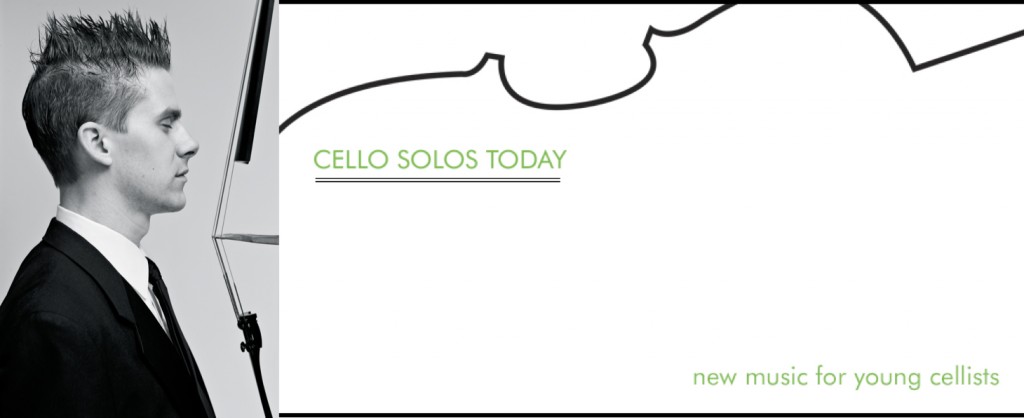
The idea behind Cello Solos Today is simple: to commission an anthology of 12 new short works (3-4 min. max) for solo cello, composed for intermediate cellists in a variety of contemporary styles by some of today’s leading composers. By creating a repertoire of new works specifically designed for the non-professional cellist, Cello Solos Today seeks to actively engage young musicians with contemporary music through firsthand performance experience. A broader goal is to strengthen a tradition of living composers writing new music for young players of all instruments.
Cello Solos Today is committed to commissioning a range of composers representing different styles, backgrounds, and ages. The following composers have agreed to contribute new works to the collection:
Anthony Cheung
Mario Davidovsky
Jonathan Dawe
Mario Diaz de Leon
James Dillon
David Fulmer
Michael Gordon
Hannah Lash
Steve Lehman
Wei-Chieh Lin
Augusta Read Thomas
Charles Wuorinen
Goals: The first goal of Cello Solos Today is the commissioning, publishing, and distribution of new work for intermediate cellists. A second, and concurrent goal, is the creation of pedagogical materials to assist musicians who may be encountering contemporary music for the first time. These materials will include an accompanying recording of each work, as well as exercises designed to introduce unfamiliar techniques and musical syntax. An emphasis would be made on creating short exercises that are creatively-based rather than pedantic, and centered on experimentation and improvisation using the materials of the work being studied. These pedagogical materials would be made available online using audio and video, with the goal of creating an easy-to-use digital resource for both students and teachers.
Impact: The target audience for Cello Solos Today is a broad community of intermediate cellists, focused on young musicians and their teachers as well as adult amateurs and musicians in the early years of conservatory study. Further, the pieces in this collection will be performed nationally by students on a range of levels, and gain widespread exposure for these composers beyond the more serious audiences who are already familiar with them. Audiences for these works will range from devoted classical music-lovers, to families and peers of students. By creating works that are technically accessible yet aesthetically demanding, Cello Solos Today hopes to engage a wider audience with contemporary classical music through the joy of performing new works.
Funding and Timeline: Cello Solos Today seeks funding for commissioning fees to create new works for intermediate cellists. Funding is expected to be completed in 2015, with new works submitted at the end of 2016. Performance and recording, as well as publication and pedagogical materials will follow completion of the collection.
Cello Solos Today is a project of the Talea Ensemble, initiated and performed by founding cellist Chris Gross. Talea is committed to engaging students and audiences with contemporary music, through residencies, institutes, masterclasses, and concert talks and discussions.
To Donate, click the donate button below. After entering your payment information, please write “Cello Solos Today” in the Special Instructions box.
Make a PayPal donation:
Or send contributions directly to:
Talea Ensemble
37-18 Northern Blvd.
Suite 208
Long Island City, NY 11101
American Immersion: Clemens Gadenstätter
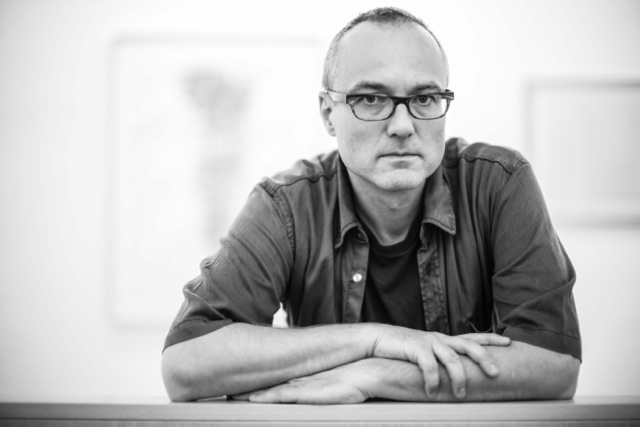
Photo by Stephan Fuhrer
In May 2015 the Talea Ensemble presents the third installment of its annual American Immersion series, this year featuring Austrian-born composer Clemens Gadenstätter. As in past years, the series offers American audiences an in-depth introduction to an important new voice in contemporary composition through chamber and large ensemble programs, in-concert discussions, and open rehearsals. Likewise, the musicians of the Talea Ensemble have the opportunity to work directly with the composer, learning firsthand his unique musical language and delving deeply into a world of new techniques and modes of expression. This year’s residency features the U.S. premiere of Gadenstätter’s bersten/platzen (Paramyth 4) for cello and piano and the JACK Quartet performing his haeuten (Paramyth 1) for string quartet. The project culminates in the world premiere of les derniers cris for ensemble, and the U.S. premieres of Semantical Investigations II and les cris des lumières, for ensemble and light.
On the subject of his Semantical Investigations, the composer writes:
For some time, I have been developing music from the sounds and acoustic events that accompany and define our everyday lives. I engage with the way our mode of listening is shaped by our experience and surroundings, and seek to create a music that deals transformatively with this contingency. At present I am working primarily with sound objects that can act as “signals” in the acoustic realm: from warning signals (sirens, etc.) and acoustic commands (an alarm clock going off, etc.) to social signals, indicators of specific, highly codified social situations (sound objects belonging to thematic complexes such as “church,” “nature,” etc.) and formalized gestures. The loaded nature of the way we hear such sounds demands compositional techniques that break through this codification of listening. Music should reveal the code, which thus remains in effect, but simultaneously negate it; it should change and dissolve the modes of perception that accompany the objects and the contexts in which they are embedded, and thus also transform their meaning into a different form and a different content through an altered way of listening.
– Clemens Gadenstätter
About the composer
Clemens Gadenstätter’s work revolves around the semantic aspects of sounds. Born in Zell am See, Austria in 1966, he studied composition with Erich Urbanner and Helmut Lachenmann and flute at the Music University in Vienna.
Gadenstätter has composed commissioned pieces for the Musikbiennale Berlin, the Südwestrundfunk Baden-Baden (Donaueschinger Musiktage 2001, 2005, 2012), Neue Vokalsolisten Stuttgart, Konzerthaus Berlin, Musik der Jahrhunderte – Stuttgart, Wien Modern, Austrian National Broadcaster ORF, Klangforum Wien, Ensemble Recherche, the Salzburger Festival, and Ensemble Modern among others. He has collaborated with a host of orchestras such as RSO – Wien, SWR Orchestra Freiburg and Baden Baden, Hilversum Kamerorkest, RSB Berlin, Philharmonie de Luxemnburg; Ensembles such as Ensemble Modern, Klangforum Wien, ASAMISIMASA – Oslo, L’Instant Donné Paris, Ensemble Recherche, Kammerensemble Neue Musik Berlin, Ensemble Ascolta Stuttgart, Neue Vokalsolisten Stuttgart, Phase Contemporary Wien, Trio Accanto Freiburg; and soloists and conductors including Peter Eötvös, Peter Rundel, Arturo Tamayo, Beat Furrer, Pascal Rophe, Johannes Kalitzke, Ernst Kovacic, Marcus Weiss, and Florian Müller.
His interest lies not only in the sounds of new music, but more generally, all sounds that shape the human hearing experience: noises from everyday life, entertainment, music, and even sounds from advertisement or movies.
iNSIDE Out Chamber Music
Thursday, May 21, 2015 7:30 PM
Austrian Cultural Forum
11 East 52nd Street
New York, NY
FREE admission, Tickets at acfny.org
moved by (2014)
bersten/platzen (Paramyth 4) (2012) *US Premiere
haeuten (Paramyth 1) (2012)
*in-concert discussion with Clemens Gadenstätter
JACK Quartet
Yuki Numata Resnick, violin
Chris Gross, cello
Stephen Gosling, piano
Works For Ensemble
Thursday, May 28, 2015 8:00 PM
Bohemian National Hall
321 East 73rd St.
New York, NY
FREE admission, Tickets at acfny.org
les derniers cris: for ensemble (2015) *World Premiere
les cris des lumières: for ensemble and light (2014) *US Premiere
Semantical Investigations II: for 11 instruments (2008) *US Premiere
James Baker, conductor
Open Dress Rehearsal
Bohemian National Hall
321 East 73rd St.
New York, NY
May 28, 2015 2:00-6:00 PM
E-mail for Seat Reservations: talea@taleaensemble.org
Presented by the Austrian Cultural Forum
With the friendly support of:
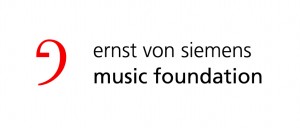
Enno Poppe: Speicher
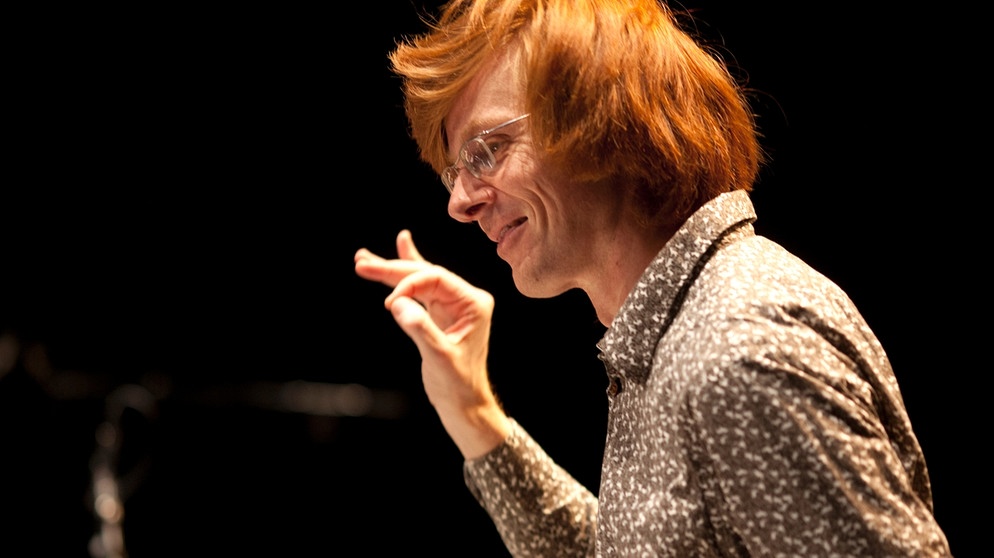
Music, as an art form, is alive. Rules and laws of musical composition are there to be reflected, updated, substituted or disposed. It starts with the definition of its smallest element: a note. Up to how much pitch variation is a note with vibrato still a single note? There is a continuum of events between vibrato, portamento, glissando and microtonal deviations. Nothing of this is covered by our music theory. Moreover, there is a barely researched relationship between tone and intonation about which performing musicians intuitively know much more than composers do, with their tendency towards taxonomy. The Speicher Project is a complex structure of variations and repetitions. Across all dimensions the elements are always in the same coherent relation. The very first viola notes (“evolving variation”) correlate exactly with the form on a small, middle and large scale. In order to move on and remain interesting, a musical piece, besides variety, needs something one can actually recognize. In that sense everything can be recognizable – an individual sound as much as a whole movement (as in a recapitulation). There is, therefore, no need to throw in idea after idea, but rather to create a network of derivations within music.
-Enno Poppe
March 13, 2015, 8 PM
EMPAC
Troy, NY
Enno Poppe: Speicher I-VI (2008-2013) *US Premiere
James Baker, conductor
Presented by EMPAC
American Immersion: Pierluigi Billone
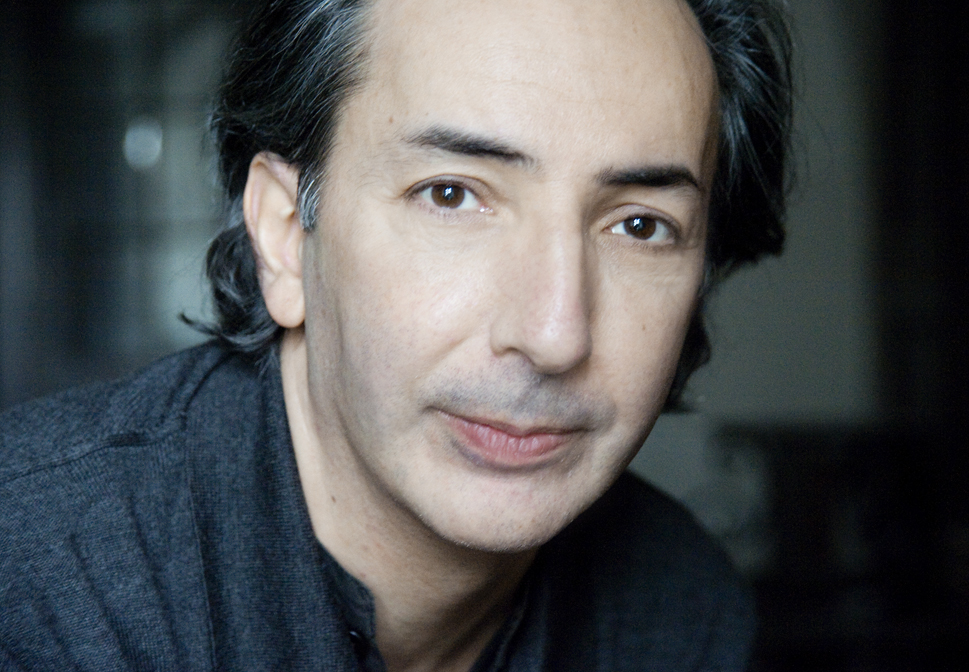
Photo by Ernst von Siemens Musikstiftung
Mani. Long (2001) is the first of many pieces with the prefix “mani” or Italian for “hand” and was commissioned by the Austrian ensemble, Klangforum Wien. All of these pieces exploit texture and timbre, revealing more and more subtle sounds organized in a way that diverts expectation. Their durations may seem extreme, but are necessary, as each soundworld is explored for the first time, the hands and body need time to register, search and move. Billone’s proportions and soundworld are constantly thwarting expectations, asking the audience to examine his works with a careful ear.
In a sense, Billone seeks to excavate sound, not in a motion to reduce it to physical properties of amplitude or wave form, or even to distinguish music from sound and sound from noise. Rather, he is tracing the culturally received and historically learned perspectives of -what is sound- and -what can be sound- and how they become defined as noise or music down towards the earth; digging for roots that enable him to ground his work deeply in a place that is revelatory rather than superficial. He begins from a place of inquiry and provocation. He believes that just as an automobile, a violin or even a computer has sound, they “cannot think a sound,” meaning that there needs to be an intention for it to be sound. In other words, sound is not an object, but a relationship. He values all of the sounds of everyday as it integrates life, for him, creating “a tension and distance” that is revealing and precious. To him, it is curious that many people are “not interested in active listening to music” but are …”constantly surrounded by sound, in the sound.” And for him, this becomes a kind of new culture: “the post modern rootless technological human being.”
Billone finds it imperative to look at the social, historical, and cultural conditions that limit sound from moving beyond these boundaries. He believes that once sound can be liberated from these ties, it will find once again its ability to energize and resonate from a more visceral and phenomenal non-discursive place that is actually about grabbing presence. He wants us to become resonant bodies; the source from which the sound emanates itself. He explores the delicate spaces between what is known and unknown; hanging in the moments before language can speak it and fully formed thoughts can define it. The audience itself becomes part of the exploration in this non-dialectical space so that openings are found, experience is singular, something has moved.
For Billone, listening is an act of seeking presence that is singular and enigmatic; seeking the unknown. He calls it “communion.”
NYC Concerts
iNSIDE Out Chamber Music
March 4, 7:30 PM
Austrian Cultural Forum
11 East 52nd St.
New York, NY
Reserve Tickets Here!
Bernhard Gander: Die Orpheus Akte II (2008)
Pierluigi Billone: Mani.Matta (2008)
Olga Neuwirth: In Nacht und Eis (2006)
*In-concert discussion with Pierluigi Billone and Olga Neuwirth
Vienna Reinvented
March 7, 8 PM
Bohemian National Hall
321 East 73rd St.
New York, NY
Reserve Tickets Here!
Olga Neuwirth: un posto nell’acqua (Herman Melville-Skizze) (2009) *US Premiere
Bernhard Gander: Take Nine for Twelve (2011) *US Premiere
Pierluigi Billone: Mani.Long (2001) *US Premiere
James Baker, conductor
Presented by the Austrian Cultural Forum and Carnegie Hall’s Vienna: City of Dreams festival. All events are free admission, ticket reservations required for some performances.
Composition Masterclass
February 28, 3 PM
Manhattan School of Music
120 Claremont Ave
New York, NY
Instrumental Performance Class
March 1, 3-6 PM
Talea Rehearsal Studio
37-18 Northern Blvd., Suite 208
Long Island City, NY
E-mail for Seat Reservations: talea@taleaensemble.org
Pierluigi Billone: Legno. Edre V. Metrio (2004)
for solo bassoon
Pierluigi Billone: ITI KE MI (1995)
for solo viola
Mani.Long Open Rehearsal
March 6, 11 AM-1 PM
Bohemian National Hall
321 East 73rd St.
New York, NY
E-mail for Seat Reservations: talea@taleaensemble.org
Mani.Long Tour
East Carolina University New Music Festival, March 21
Greenville, NC
Brandeis University, March 29
Slosberg Hall
Waltham, MA
With the friendly support of:

Georges Aperghis: Happy End
Happy End from Klaas Verpoest on Vimeo.
HAPPY END: for animated film, live electronics, and ensemble
“A gently paced film animation- a boundless wander through imaginary cities. This long adventure is responded to by Aperghis’ music.”
—Klaas Verpoest
He pulled the ogre’s boots off and donned them himself.
Once upon a time there lived a woodcutter and his wife, who had seven children, all of them boys. The eldest was only ten years old, the youngest only seven.
The woodcutter and his wife were very poor, and their seven children caused them a lot of hardship, because none of them was old enough to earn a living. What troubled the couple further was that the youngest was extremely delicate and never uttered a word, which they took to show his stupidity, although it was a sign of intelligence. He was very small; when he was born he was hardly bigger than a man’s thumb, for which reason Little Thumb was what he was called. —from Little Thumb by Charles Perrault.
Perrault’s fairy tale from 1697, is based on the character archetype of Tom, a small boy who, through his own wit and resourcefulness, is able to overcome enormous challenges to succeed despite everyone’s low expectations of him. In this particular story, “le Petit Poucet” saves himself and his brothers from a hungry child-eating ogre after they are abandoned in a dense forest by parents who could no longer afford to keep them. The tale, however frightening and improbable, reminds us of the moral to never underestimate the underdog. He turns up in other creative interpretations, for example, he and his brothers and the ogre appear in the last act of Tchaikovsky’s “Sleeping Beauty” and also in Ravel’s “Ma Mere l’Oye.”
“Happy End” was created by French composer Georges Aperghis and Belgian video-artist, Hans Op de Beeck (with the voices of Edith Scob and Michael Lonsdale), who collaborated to bring an adaptation of “Le Petit Poucet” to the stage in 2007 at the Opera Lille in France with Belgian Ensemble Ictus. At an hour long, the work features a 16-member ensemble on stage with live electronics, projected video and prerecorded voices. It is an arresting, all encompassing experience that pulls the audience into the world of the story, becoming more than just a re-telling of the tale and closer to a psychological journey into the mind of its protagonist. It is described as “the result of a remarkable artistic triangle” that portrays “a boundless wander through imaginary cities.” (Klaas Verpoest) The black and white film contains animation, text and narration. While the music is a sonic representation of the visual, it is also critical fundamental matter with its own psyche.
Inventive composer Georges Aperghis’ (born in 1945 based in France) work teeters precipitously along spaces between concert music, theater and opera. He founded the Atelier Théâtre et Musique (ATEM) and influenced by his relationship with actors, has incorporated theatricality into his pieces, often treating the text, actors, voice, staging, musical instruments, and movement equally in his scores. His work is virtuosic, rhythmically complex, and exploits the limits of register and dynamics, yet at times exhibits a playful and absurd quality. Aperghis’ works defy categorization and immerse the audience in a totality of experience.
April 23, 2014
Roulette, Brooklyn
January 9, 2015
I/O Festival, Williams College
Williamstown, MA
May 8, 2015
Institute for Contemporary Art
Boston, MA
Georges Aperghis: Happy End (2007) *US Premiere
Animated feature film: Hans Op de Beeck, Bruno Hardt, Klaas Verpoest
Computer Music Production: Sebastien Roux
Conductor: James Baker


Funded by the French-American Fund for Contemporary Music, a program of FACE with major support from the Cultural Services of the French Embassy, SACEM, Institut Francais, the Florence Gould Foundation, and the Andrew W. Mellon Foundation.
Supported in part by the Harry and Alice Eiler Foundation.
Lincoln Center Festival: Matsukaze
“I have chosen Matsukaze, one of Zeami’s finest works, as a starting point, reconstructed its libretto, composed music, and by means of new stage directions, tried to create a new opera based on a No- which lives in our own time.” –Toshio Hosokawa
Matsukaze (Pining Wind or Wind in the Pines) is regarded as one of the most beautiful of the Noh plays. Written in the 15th century by Ze-ami, the title is a poetic play on words. Matsu can mean pine tree or to wait or long for, while kazu is the word for wind. A nobleman is exiled briefly to the Bay of Suma where he falls in love with two sisters, Matsukaze and Murasame (Autumn Rain), whose job was to ladle brine in order to make salt. He promises to return to them, but after word comes of his death, they die of grief. Hundreds of years later, the sisters continue to linger as spirits in the mortal realm, awaiting Yukihira’s return, still attached to their mortal love.
Toshio Hosokawa opens his modern Noh-opera with sounds of the ocean as a monk comes ashore and encounters a lone pine tree. After he learns that this is the grave marker for the two sisters, he prays for their souls. Matsukaze and Murasame then appear to him and sob. Matsukaze, wearing the robe of Yukihira, mistakes the pine tree for her lost lover and tries to embrace it. Murasame is unable to calm her. The monk offers a memorial service and then in a dream, the spirit sisters disappear. The opera closes with the sound of hundreds of pine needles falling from the sky, touched by wind (Matsukaze) and showering the ground like rain (Murasame).
Hosokawa, born in 1955, studied in Germany and is considered Japan’s most prominent living composer. His compositional process is strongly informed by concepts of Zen Buddhism and nature.
In a co-production with the Spoleto Festival, the Lincoln Center Festival brings Matsukaze to the Gerald W. Lynch Theater with a new production that reflects its American premiere. Spoleto Festival resident conductor, John Kennedy will conduct the Talea Ensemble with a cast of four soloists and small chorus.
For more information:
Trailor for Berlin Production:
Arte TV short documentary (in French or German only)
Purchase Tickets: Lincoln Center Festival
July 18-20, 2013
Gerald W. Lynch Theatre
New York, NY
Composer: Toshio Hosokawa
Libretto: Hanna Dübgen
Director: Chen Shi-Zheng
Conductor: John Kennedy
Set design: Chris Barreca
Lighting design: Scott Zielinski
Video design: Olivier Rosset
Costume design: Elizabeth Caitlin Ward
Cast: Pureum Jo (Matsukaze); Jihee Kim (Murasame); Gary Simpson (Monk); and Thomas Meglioranza (Fisherman)
American Immersion: Beat Furrer
In May of 2013, Swiss/Austrian composer Beat Furrer will be in residence with the Talea Ensemble in NYC. This intensive week of immersion will include many layers of engagement with the composer: open rehearsals, lectures, in-concert discussions, performances of his chamber works, all culminating in the American premiere of Furrer’s masterpiece evening length FAMA, “an aural theatre in eight scenes.”
In 2001, Furrer wrote in the notes to his first opera, Orpheus’s Books, “The narrative, compressed into a single instant and captured in endless repetition, is projected into changing spaces. Filtering processes cause individual layers to recede into the background or come to the fore, thereby generating contrasting perspectives. Linear time gives way to spatial depth: processes are »verticalized«, and momentary snapshots are probed by movable filters in ever-new perspectives.” These ideas have already been at work in his earlier pieces, Nuun and still, and have proven to remain at the center of his thought, providing further impulse to create FAMA.
FAMA is scored for 22 instrumentalists, 8 singers, and one actress. The concept of the work borrows from a description of Roman poet Ovid’s “Metamorphoses,” of the home of the goddess Fama (the Goddess of Rumor), “a place to which all the events and sounds of the world come and find resonance.” This space has an “overwhelming sensuality” where, “There is no shouting, but a murmur, like the sea, that sounds from a distance, or the last echoing rumble of thunder.” With this metaphor, Furrer adds another layer of narrative taken from Arthur Schnitzler’s short novel, “Fraulein Else,” about a young girl forced into prostitution in order to support her debt-ridden father.
Furrer conceived of a “space within a space,” a box designed as an instrument of and in itself, where the audience lies inside and the musicians and singers outside. The walls are moveable and are made of an acoustically reflective material on one side, and an absorbent material on the other, harnessing and transforming the perceptual space and in effect, the soul of Schnitzler’s character as she descends into madness. FAMA is intensely personal, evocative of existential drama, pain and heartache found in the sonic tapestry of the work. Furrer believes that every note’s decay is rich with drama and that every musical gesture has the power to tell a story. The musical materials that Furrer constructs can be heard as projections of Else’s thoughts, turning into shards as the piece progresses, changing context and meaning as her identity is lost. FAMA consists of scattered muttering and whispering of voices and instruments, a solo violin, a dialogue between bass clarinets and an unsettling scene featuring Else’s hysterical speech accompanied by contrabass flute.
FAMA (2004-2005)
Aural theater in eight scenes for large ensemble, eight-part (SSAATTBB) and actress
Texts: Arthur Schnitzler, Lucretious, Carlo Emilio Gadda
Program Note:
A young woman before a mirror “Am I really so beautiful? – Is that me there who speaks?” She experiences herself though the projections of the society around her, reflects in the image of others. Her nakedness shows her exposed, defenseless, an object of desire. An obsessive view from without: she has not yet found herself, remains a stranger to who she is. In Schnitzler’s novel, Fräulein Else – which appears as the basic narrative layer – is sent out into the fine world of a glitzy Italian hotel in the Dolomites. Else has a hopeless, demure sense of the direction in which this society is leading her, a society whose women are kept on the end of leads attached to pearl collars. “When I marry, I will most probably do it cheaper” – marriage is another form of prostitution. Her mother’s beseeching letters pressure her: Else must find money to support her debt-ridden father, first thirty and then fifty thousand guilders. The sponsor’s price is high and leads Else to a world of self-destruction, a further “victim on the altar of a world of total reification” (Furrer).
The U.S. Premiere of FAMA:
The box theatre no longer exists since its last presentation in 2006. However, Beat Furrer and Talea are collaborating to present FAMA in an un-staged concert version. They will be joined in two concerts presented at the Bohemian National Hall by New York-based vocal ensemble, Ekmeles, and actress/singer, Bo Chang.
May 16th and 17th, 2013 8:00PM
Bohemian National Hall
321 East 73rd Street
New York, New York 10021 
To reserve free tickets for May 16 concert, please visit:
http://www.acfny.org/event/beat-furrer-fama/
Bo Chang, actress
Tara O’Connor, contrabass flute
Ekmeles vocal ensemble
James Baker, conductor
Presented by the Austrian Cultural Forum and Bohemian National Hall.
Generously funded by ProHelvetia Ernst von Siemens Musikstiftung and the Harry and Alice Eiler Foundation.
![]()
With the friendly support of:
iNSIDE Out Chamber Music Concert
Three nights prior to the performances of FAMA, Talea will present an evening of Furrer’s chamber music at the Austrian Cultural Forum. This concert serves as a glimpse inside Furrer’s sound world. Audiences will have the opportunity to engage with the composer during an informal in-concert discussion, thus gaining more insight into the concepts behind his work.
May 14, 2013 7:30pm
Austrian Cultural Forum
11 East 52nd Street
New York, NY 10022 
Program:
Beat Furrer: Lotófagos I (2006)
Beat Furrer: Studie for Piano (2011) *US Premiere
Beat Furrer: Scene VI, from FAMA (2004)
Beat Furrer: Lied (1993)
Tony Arnold, soprano
Tara Helen O’Connor, contrabass flute
Steven Beck, piano
Yuki Numata Resnick, violin
Greg Chudzik, double bass
Presented by the Austrian Cultural Forum.
Generously funded by ProHelvetia and Ernst von Siemens Musikstiftung.
![]()
With the friendly support of:
Beat Furrer Composition Lecture
Manhattan School of Music
132 Claremont Ave, New York
May 13, 8 PM
Reservations required: E-mail talea@taleaensemble.org
Open Dress Rehearsal
Bohemian National Hall
321 East 73rd St., New York
May 16, 4-5 PM
Reservations Required: E-mail talea@taleaensemble.org
About the Composer:
From an interview on Universal Edition’s page on the composer (his publisher from the early 1980s-1995), Furrer says about his work, “For each piece I want to create the material and the interrelationship of the intervals anew. Composing would not interest me if I had the impression that I was reproducing a well-worn concept rather than taking a step in a new direction. Surely, some works are recognizably linked together in that they spin on the same idea but always, that idea appears in a completely new light”. Beat Furrer’s work can be seen as an exploration on modalities of expression, always curious about context and meaning and how they transform musical material. This has led to a rich sound world of extended instrumental and vocal techniques. His body of work is impressively vibrant and multi-layered, with a stunning luminosity.
Beat Furrer was born in Switzerland in 1954. He relocated to Vienna 1975 to pursue studies with Roman Haubenstock-Ramati (composition) and Otman Suitner (conducting). In 1985 he co-founded Klangforum Wien, which he directed until 1992 and is now regarded as one of Europe’s leading contemporary music ensembles. He remains with the ensemble as conductor. He was awarded the Music Prize of the City of Vienna in 2003 and the Golden Lion, for the monodrama “FAMA,” at the 2006 Venice Biennale. Furrer has been a professor of composition at the University for Music and Performing Arts in Graz, Austria since 1991.
Fausto Romitelli Recording Project
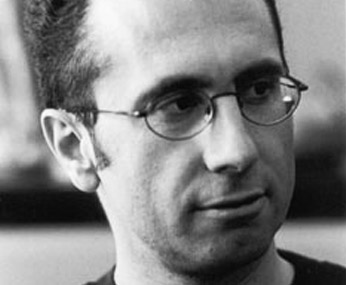
Tzadik
EMPAC
Fausto Romitelli:
- Amok Koma (2001)
- Domeniche alla periferia
dell”impero (2000) - La sabbia del tempo (1991)
- Nell”alto dei giorni
immobili (1990) - Blood on the Floor,
Painting 1986 (2000)
In Spring 2012 Talea recorded a very special CD of Fausto Romitelli”s music at the finest American recording institution, EMPAC, which was released on Tzadik in July 2012. The CD consists of five world premiere recordings and the first release of Romitelli”s music on an American record label.
Talea has become connected to Romitelli”s body of work after bringing this unique composer”s voice to the United States through six US Premieres in the past two years, including the first American performance of the cycle Professor Bad Trip in 2010, and the United States premiere of his final masterpiece, An Index of Metals in 2011. Romitelli”s music is a collage of styles that defy classification; his work drawing from all corners and incorporating timbres associated with psychedelic rock music and spectral harmony. From screaming electric guitar and electronics to sensual textures, his music is fresh and innovative in the contemporary canon. At times, his hellish sound-world evokes nightmarish and hallucinatory qualities that inspire a visceral listening experience. Romitelli”s career was just beginning to flourish when his life was tragically cut short at age 41. As Talea has dedicated so much to this remarkable composer, this new recording on Tzadik will be a special landmark and tribute to a modern master.
Talea is thrilled to collaborate with Tzadik and EMPAC on this project. Get your copy here: Tzadik.com
Harvard Summer Composition Institute
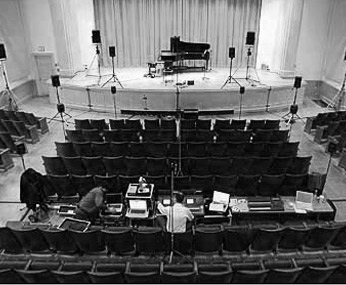
2014 Dates TBA
Chaya Czernowin
Composition Faculty
Hans Tutschku,
Composition Faculty
Dr. Steven Kazuo Takasugi,
Managing Director/
Composition Faculty
Beginning in the summer of 2012, the Harvard Summer Institute for Music Composition is proud to host its first International Summer Course for Composers of New Music. The gathering of twelve young composers will take place in two of England’s best known sites: Concord’s historic Colonial Inn and Harvard University in Cambridge, Massachesetts.
During the first week of two-week residency, composers will meet with the composition faculty for individual lessons and meet each other in organized one-on-one sessions to discuss their compositions. Furthermore, each composer will offer a presentation before the entire group, introducing his or her music for feedback and discussion.
During the second week of the course, these activities will continue supplemented by lectures on notation, instrumental techniques, and full practical application of compositional knowledge and realization through intense and focused rehearsals as the Talea Ensemble joins the course in Harvard’s historic and newly renovated Paine Hall. Here Talea will prepare two full-evening concerts of twelve world premiere pieces that the composers have written commencing eight months prior to the public event. Works involving electronic setups will be welcome. Additionally, during the last days of the course, a symposium open to the public will take place focusing specifically on some of today’s most pressing-aesthetic issues and the new technologies.
International lecturers and young composers from diverse music departments from across North America and overseas will be invited to participate in round-table discussions and attend the concerts and receptions. Admission to the concerts and symposium is free to the public.
The Harvard Summer Institute is made possible by the generous support of Harvard University, Art Mentor Foundation Lucerne, the Harry and Alice Eiler Foundation, and the administrative staff of Harvard Music Department.
